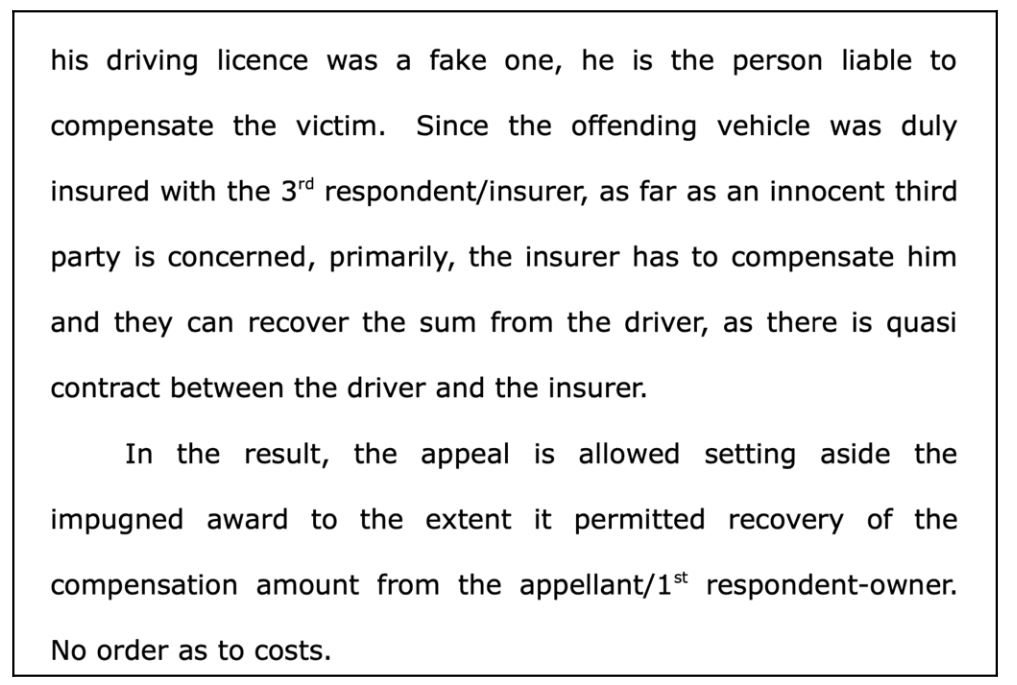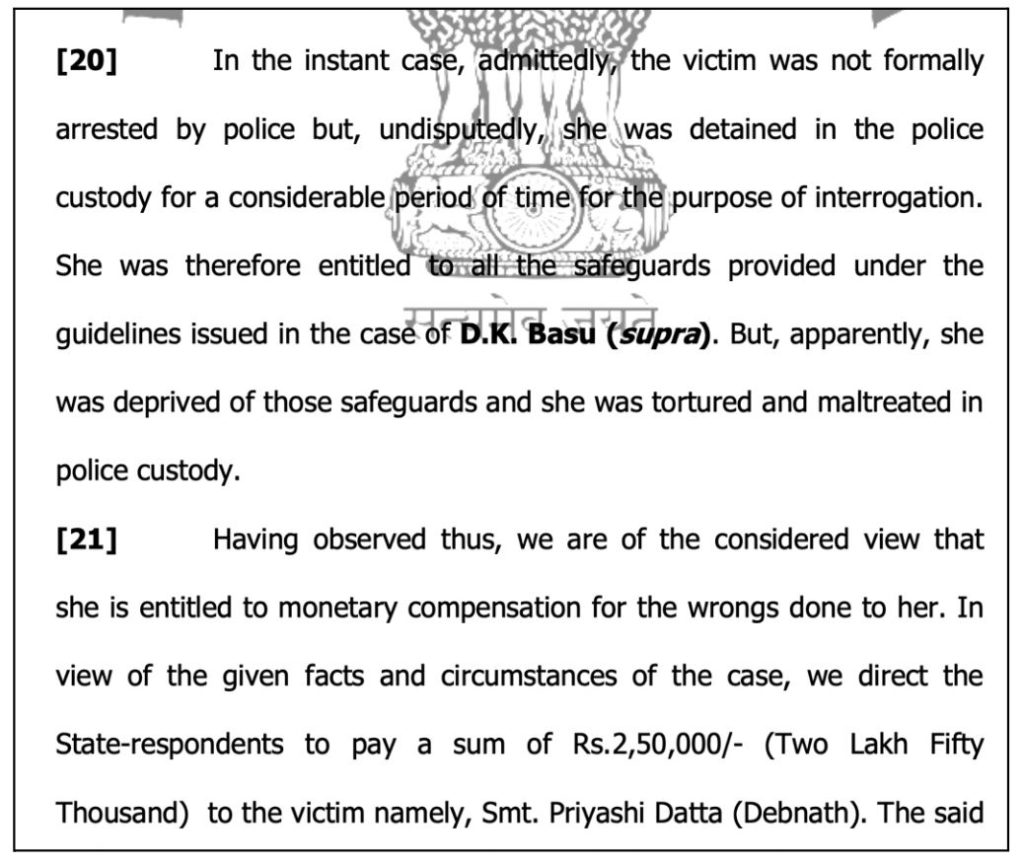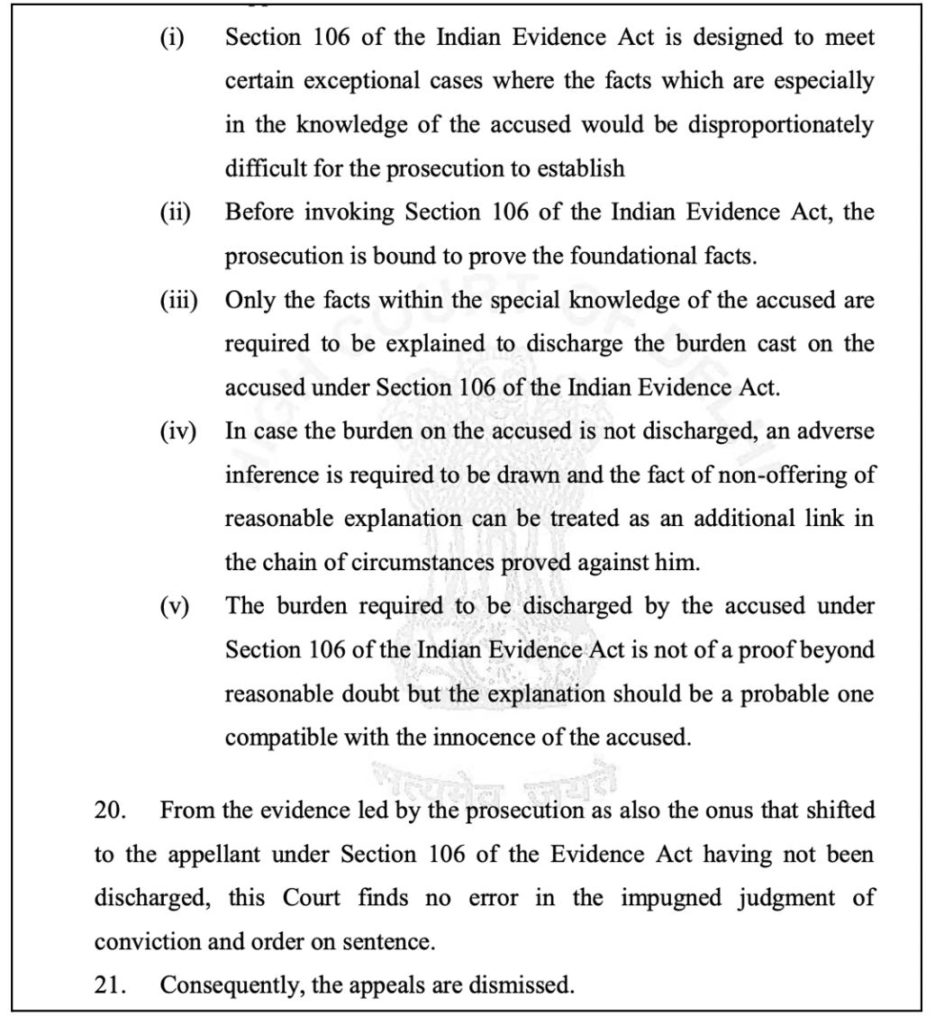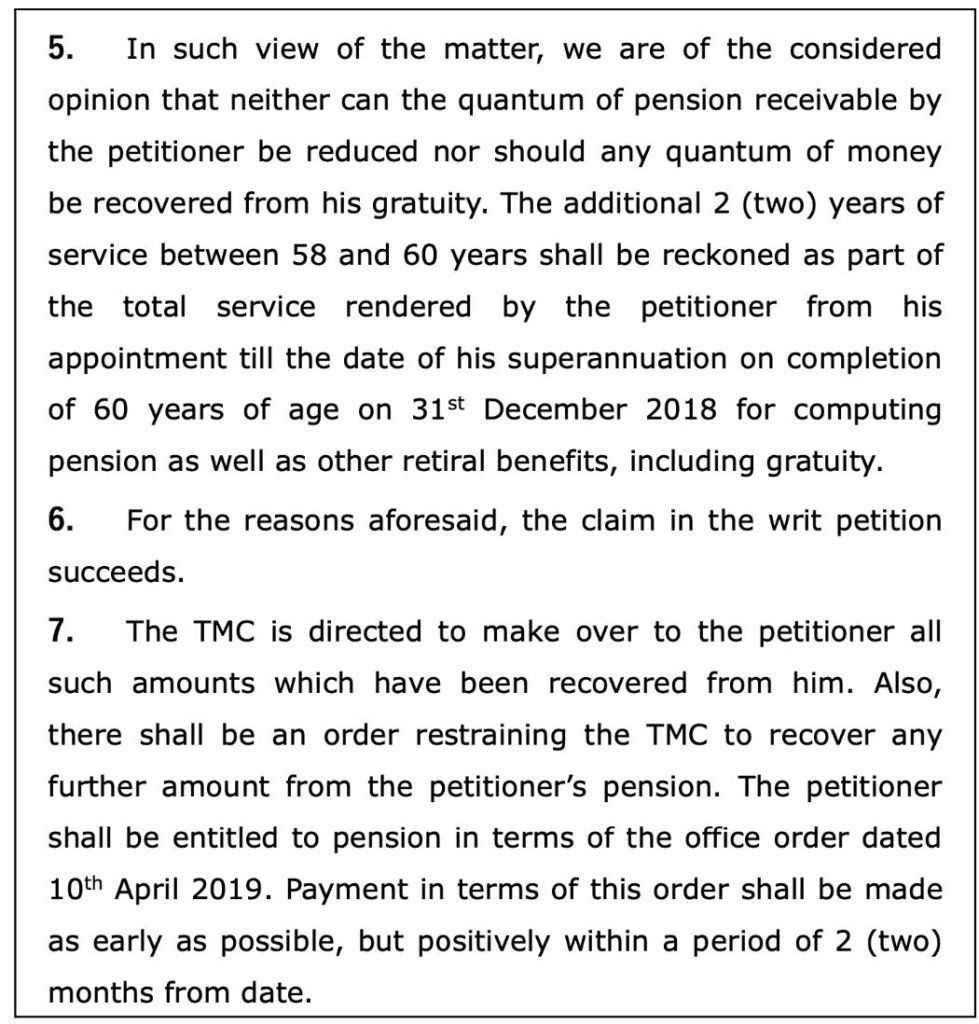In this week’s review of Court Judgments, we look at Tripura High Court’s suo motu notice and directions for compensation in a case of custodial torture, Kerala High Court’s observation regarding the extent of liability of vehicle owner regarding the driver’s genuineness of license, Supreme Court’s directions to interpret pension rules in favour of the employee, Bombay High Court’s judgment regarding retirement benefits impacted by misinterpretation of law by Municipal corporation and Delhi High Court’s observation regarding the onus of burden of proof lying with accused.
Kerala HC: Vehicle owner not liable if he was of bona fide belief regarding the genuineness of driver’s license.
In the case Aisha vs. Xavier & Ors , the appellant was the owner of the stage carrier, while the 2nd respondent was the driver when it met with an accident. The vehicle was insured by National Insurance Co. Ltd. It was proved before the Motor Accidents Claims Tribunal (MACT) that the driving of the respondent was rash and negligent which led to the accident.
The insurer also contended that the driver did not have a valid license and since the owner has entrusted the vehicle to the 2nd respondent, she violated the terms and conditions of the policy. Therefore, is not liable to be indemnified by the insurer.
The Tribunal awarded a compensation of Rs. 5.66 lakhs to the injured and directed the Insurance company to deposit the amount. Since the driving license was found to be fake, it allowed the insurance company to recover the compensation amount from both the owner as well as the driver.
Further, the driver was charged under Section 3(1) read with Section 181 of the Motor Vehicle Act, for not having a valid driving license and not being able to produce the same in court.
This decision of the Tribunal was challenged by the owner of the vehicle and an appeal was filed in Kerala High Court. The Appellant i.e., the owner, stated that the driver had produced a diving license which was renewed from a local RTO. The appellant was also content with the competency of the driver to drive the vehicle. Hence, did not further enquire if the license was original. In the appeal, it was asserted that there was no need for the owner to satisfy herself beyond the competency of the driver, and to check the validity of the license.
It was also submitted that since the accident was due to rash & negligent driving and the license was a fake one, the driver was liable to compensate the victim.
With respect to the fake license, the Motor Vehicle Act states that if the renewing authority is different from the initial issuing authority, the same needs to be intimated to the issuing authority. If this was duly followed, the issue of a fake license would have been brought to light. Therefore, in this case, the Appellant cannot be faulted.
The counsel for respondents submitted that if the owner had verified the competency of the driver and the genuineness of the license, she would have realized that the driving license was a fake one. It was also submitted that, since there is no contract between the insurance company and the driver, it cannot recover the amount from the driver.
Justice Sophy Thomas accepted the submission of the appellant that she has been under the bona fide belief that the renewed license was a genuine one. The court relied on the judgment in the case, Rishi Pal Singh vs New India Assurance Co Ltd & Ors, wherein the court observed that the owner is expected to check the skill of the driver before the appointment and is not responsible to verify the genuineness of the driving license.
It further added that the Insurance companies cannot expect the owners to contact the RTOs to check the genuineness of the license. The court also said that the insurance company does not have a case to prove that the owner was aware of the driving license being fake.
It also rejected the contention by the insurance company that it does not have any contract with the driver and hence cannot recover the amount. This was based on the judgment in the case Oriental Insurance Company Ltd. vs. Sivan.
The court observed that the Insurance company is primarily liable to compensate the injured in an accident and that it can recover the amount from the driver.

Supreme Court: Pension rules must be interpreted in favour of employees when more than one interpretation is possible
Supreme Court Bench comprising of Justice Indira Banerjee and J.K. Maheshwari observed that in case of the possibility of more than one interpretation of the Pension Rules, the courts should lean towards the interpretation that favours the employee.
The Apex Court made this observation in the case, State of Rajasthan vs O P Gupta. As per the case details, the issue raised in the writ petition filed before the Rajasthan High Court was whether the service of the Writ Petitioner prior to the resignation from Rajasthan State Agro Industry Corporation should be considered for the purpose of payment.
This writ petition was disposed by the Rajasthan High Court, directing to consider the service rendered by the writ petitioner with both the Rajasthan Agriculture Engineering Board and Rajasthan State Agro Industry Corporation, to compute the total pension. The direction was also issued to release his pension and retiral benefits including arrears of pension with interest @ 9% per annum within 3 months.
The Writ Appeal filed by the State was dismissed by the Division Bench of the High Court. The State contended that the High Court has misconstrued Rule 25(2) of the Rajasthan Civil Services (Pension) Rules, 1996. It contended that resignation would imply the forfeiture of the past service with Rajasthan State Agro Industry Corporation.
The Supreme Court bench observed that pension is a lifelong benefit and the denial of it is a continuing wrong. It noted that the court cannot be oblivious of the financial challenges faced by the retirees and therefore the interpretation of rules needs to be in favour of the employee.

The Apex court observed that the judgment of the Rajasthan High Court was a purposive interpretation of the said Rule. It proceeded to dismiss the appeal filed by the State.

Tripura HC: Directed State government to pay Rs. 2.5 lakhs as compensation to a woman who was subjected to custodial torture.
The Chief Justice of Tripura High Court took a suo motu notice of a news item in a local daily, which reported the custodial torture of a 28-year-old woman in police lockup. A PIL was filed, and notices were issued to the State-respondents including the Secretary, Home Department and Director General of Police.
The bench comprising of Chief Justice Indrajit Mahanty and Justice S.G Chattopadhyay presided over this case.
The State contended that there was no proof of custodial torture of the victim in police lockup. It was stated that she was called to Police station for interrogation regarding a theft case. She fell ill during the interrogation and was taken to AGMC & GBP hospital, where she was given adequate medical treatment. The State further submitted that the newspaper report was not true.
Amicus curiae submitted that as per the statement of the victim, she was called to the police station on basis of a false and unverified allegation of theft and that she was physically tortured during interrogation. The medical report states that the injuries found on the victim show a history of physical assault. It was argued that the available evidence points to the fact that the woman was beaten in police custody and hence suffered the injuries.
The court considered the facts and circumstances presented before it and concluded that the police called the victim only on the basis of telephonic information received from a neighbour of the victim, without verifying the facts. The medical reports establish that she was physically assaulted in police custody. Further, there was no formal arrest done by the police. However, she was detained for a substantial amount of time, which entitle her to custodial safeguards and the police were obliged to protect her against all forms of atrocities in the custody. She was deprived of these safeguards and was tortured in custody.
The court found her to be entitled for monetary compensation for the wrong doings on her. It directed the State to pay Rs. 2.5 lakhs to her as compensation.

Delhi HC: Burden of Proof lies on accused when last seen together with deceased.
Dismissing the appeals filed by two men convicted for murdering three people, Delhi High Court said that in a case where the accused is last seen together with the deceased, the prosecution is exempted to provide proof and the burden of proof lies on the accused.
Both persons were convicted of life imprisonment for the murder. This conviction was challenged with the argument that both were convicted based on circumstantial evidence. The two circumstances were – both were found at the place of the incident when the police arrived and the clothes worn by one of the convicted, Gurdeep Singh was found to be stained with blood.
The counsels representing both argued that the conviction was based on circumstantial evidence and the chain of circumstances needs to be established to prove the guilt.
The prosecution argued that only these two persons were found inside the property where the incident took place and there was no other person when the police arrived. The postmortem report confirms that the deceased were murdered.
The court analysed section 106 of the Indian Evidence Act and upheld the conviction. It observed that section 106 is designed to meet certain exceptional cases, where it would be difficult for the prosecution to establish the case. In such cases, the burden of the proof lies on the accused.

Bombay HC: Cannot recover ‘Excess retiral benefits’, after allowing officer to continue beyond retirement date
As per the details of the case, Dr. Prakash Borulkar vs State of Maharashtra and Ors, the petitioner was supposed to retire at the age of 58 on 31 December 2016. As per a Government Resolution in 2015, he was permitted to continue in service up to 31 December 2018, until he attained 60 years of age. His last drawn salary was Rs. 28,600 based on which his pension and gratuity were fixed.
However, the State Government has clarified in 2022, that the GR was applicable to officers in Public Health Department and not in Municipal Corporations or Councils. This clarification was applied to the petitioner as well, because of which a petition was filed by him in the court.
The high court bench of Chief Justice Dipankar Datta and Justice Madhav J. Jamdar, observed that the petitioner did not seek an increase in the retirement age from 58 years to 60 years. There was no misrepresentation on his part. Further, the Municipal Corporation permitted him to continue in the service for the two extra years.
It was not even a case where the pay was erroneously fixed, as the petitioner has served those two extra years and earned his salary. The mistake, if at all any, lies with the Municipal Corporation for misreading the government resolution and the blame would fall on them. The court said that any recovery from the petitioner would be harsh and will outweigh the Municipal corporation’s right to recover any excess amount paid.
The court observed that the petitioner’s pension and gratuity was fixed based on the length of record of the service and it cannot be reduced. It directed that no money should be recovered and to refund any amount if already recovered.

Featured Image: Review of Court Judgments


